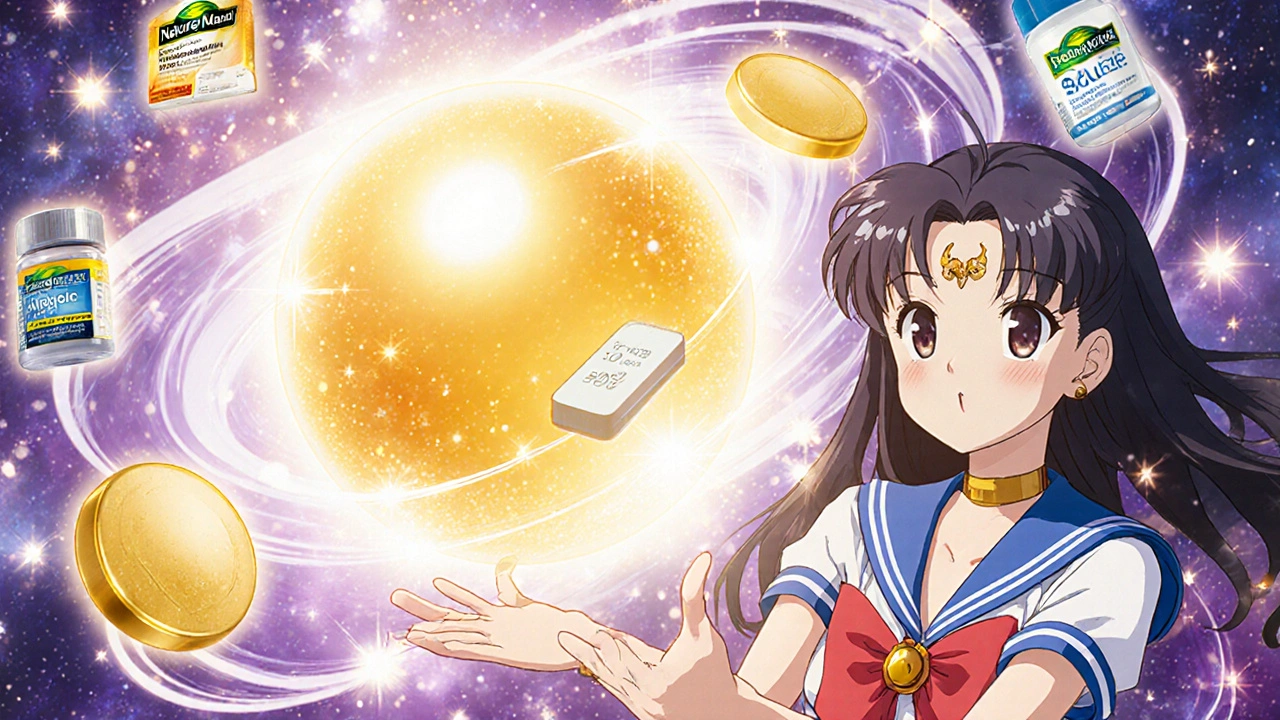Vitamin C Supplement Selector
Find Your Best Vitamin C Supplement
Answer a few questions to get a personalized recommendation based on your health needs and budget.
Ever bought a bottle of Limcee thinking it was the only way to get your daily vitamin C, only to find out there are dozens of other options on the shelf-and most cost half as much? You’re not alone. Limcee, a popular brand of ascorbic acid tablets in many countries, is often recommended by pharmacists and used by families for colds, fatigue, or just general health. But is it really the best choice? Or are you paying more for the name than the science?
What exactly is Limcee?
Limcee is a branded version of ascorbic acid, which is the pure, synthetic form of vitamin C. Each tablet typically contains 500 mg or 1,000 mg of ascorbic acid, with no added fillers, flavors, or other nutrients. It’s simple. It’s cheap to make. And it works exactly like the vitamin C your body needs to repair tissue, absorb iron, and support immune function.
There’s no magic here. Limcee doesn’t contain bioflavonoids, zinc, or rose hips like some premium brands. It’s not time-release. It’s not buffered. It’s just ascorbic acid in tablet form. That’s fine-if you know what you’re getting. But if you’re buying it because you think it’s superior, you might be misled.
How does Limcee compare to other vitamin C supplements?
Let’s break it down by type. Not all vitamin C supplements are the same, even if they all contain ascorbic acid.
1. Plain Ascorbic Acid Tablets (Like Limcee)
These are the most common and cheapest. Brands like Now Foods, Nature Made, and local generic versions from pharmacies like Pharmacy2U or Guardian offer 500 mg or 1,000 mg tablets for as little as $0.05 per dose. Limcee usually costs $0.10-$0.15 per tablet, depending on where you buy it. The active ingredient is identical. The only differences are branding, packaging, and price.
2. Buffered Vitamin C (Calcium Ascorbate, Sodium Ascorbate)
If your stomach gets upset with plain ascorbic acid, buffered forms might help. These versions are less acidic, so they’re gentler on the digestive system. Brands like Thorne Research and Pure Encapsulations make calcium ascorbate, which adds a small amount of calcium along with vitamin C. One study in the Journal of the American College of Nutrition found that buffered forms caused significantly less gastric discomfort than plain ascorbic acid in sensitive individuals.
Limcee doesn’t offer this. If you get heartburn or nausea after taking it, switching to a buffered version could make a real difference.
3. Vitamin C with Bioflavonoids
Bioflavonoids are plant compounds found naturally in citrus fruits. Some studies suggest they help with vitamin C absorption and may have their own antioxidant effects. Brands like Garden of Life and Swisse include hesperidin and rutin in their formulas. While the science isn’t conclusive, many people report feeling more energized or noticing better skin health when using these blends.
Limcee has none of this. It’s pure chemistry. If you prefer supplements that mimic whole-food sources, this matters.
4. Time-Release Vitamin C
Some brands release vitamin C slowly over 6-8 hours, aiming to keep levels steady in your blood. This is based on the idea that your body can’t store vitamin C, so it gets flushed out quickly. Time-release versions, like those from Solgar or Life Extension, may help maintain consistent levels-especially if you’re taking higher doses (1,000 mg or more).
Limcee is immediate-release. You get a spike, then it’s gone in a few hours. For most people, that’s fine. But if you’re taking it for immune support during illness, a time-release version might give you more consistent coverage.
5. Liposomal Vitamin C
This is the premium end. Liposomal vitamin C uses tiny fat bubbles (liposomes) to deliver the nutrient directly into your cells, bypassing the gut. Studies show it can achieve higher blood levels than regular tablets. Brands like LivOn Labs and Cell Nutrition charge $30-$50 for a month’s supply. That’s 10-20 times more than Limcee.
Is it worth it? For healthy people taking 500 mg daily? Probably not. But for someone with malabsorption issues, chronic illness, or high oxidative stress, it can make a measurable difference. Limcee doesn’t come close here.
Who should stick with Limcee?
Limcee is a solid choice if:
- You need a simple, no-frills vitamin C supplement
- Your budget is tight and you’re buying in bulk
- You don’t have stomach sensitivity to acid
- You’re taking it for general health, not therapeutic purposes
Many families in New Zealand, India, and Southeast Asia rely on Limcee because it’s affordable, widely available, and effective. If you’re using it to prevent colds or fill a nutritional gap, it does the job.

Who should look elsewhere?
Consider alternatives if you:
- Get stomach upset from plain ascorbic acid → try buffered vitamin C
- Want better absorption or whole-food synergy → choose vitamin C with bioflavonoids
- Take high doses regularly → time-release may be more effective
- Have digestive disorders, chronic fatigue, or are recovering from illness → liposomal or intravenous options (under medical supervision) may be better
One patient I spoke to in Auckland switched from Limcee to a buffered form after years of acid reflux. Within two weeks, her symptoms disappeared. She didn’t need more vitamin C-she just needed a gentler delivery method.
What about natural vs. synthetic vitamin C?
There’s a myth that vitamin C from oranges is better than lab-made ascorbic acid. It’s not true. Chemically, they’re identical. Your body doesn’t care if it came from a citrus fruit or a factory. The difference lies in what else is in the supplement.
Whole foods like oranges give you fiber, potassium, and other phytonutrients. Supplements give you concentrated doses. If you’re eating five servings of fruits and veggies daily, you probably don’t need a supplement at all. But if you’re not, then a simple tablet like Limcee is better than nothing.
Price comparison: Limcee vs. top alternatives
| Brand/Type | Form | Cost per Dose | Key Features |
|---|---|---|---|
| Limcee | Plain ascorbic acid | $0.12 | Simple, widely available, no additives |
| Nature Made | Plain ascorbic acid | $0.06 | USP verified, affordable, same as Limcee |
| Thorne Research | Calcium ascorbate | $0.25 | Buffered, gentle on stomach, no fillers |
| Swisse | Ascorbic acid + bioflavonoids | $0.30 | Includes citrus extracts, better taste |
| LivOn Labs | Liposomal vitamin C | $1.80 | Higher absorption, premium price |
Notice something? Limcee isn’t the cheapest. Generic brands like Nature Made or CVS Health often beat it on price. And if you need something gentler or more effective, you’re better off spending a little more on a targeted option.

What’s the right dose?
The Recommended Dietary Allowance (RDA) for adults is 75-90 mg per day. Most people get enough from diet alone. But many take 500-1,000 mg daily for immune support. That’s safe for most people. The upper limit is 2,000 mg per day. Beyond that, you risk diarrhea, nausea, or kidney stones.
There’s no evidence that taking 2,000 mg of Limcee makes you immune to colds. But taking 500 mg daily during winter might slightly reduce the duration of a cold by 8-14%, according to a 2020 Cochrane review of 29 trials.
Don’t overdo it. More isn’t always better.
Final verdict: Is Limcee worth it?
Limcee is a reliable, no-nonsense vitamin C tablet. It’s not broken. It doesn’t need fixing. But it’s also not special. You’re paying a premium for brand recognition, not better science.
If you’re healthy, on a budget, and don’t have stomach issues, Limcee is fine. But if you’re looking for better absorption, gentler digestion, or added nutrients, there are smarter, sometimes cheaper options.
Don’t buy Limcee because your neighbor uses it. Buy it because it fits your needs-and if it doesn’t, switch without guilt. Your body doesn’t care about the label. It only cares about what’s in the tablet.
Is Limcee the same as generic vitamin C?
Yes. Limcee contains pure ascorbic acid, the same active ingredient found in generic brands like Nature Made, CVS Health, or local pharmacy store brands. The only differences are packaging, branding, and price. The effectiveness is identical.
Does Limcee cause stomach upset?
Yes, it can. Ascorbic acid is acidic, and some people experience heartburn, nausea, or bloating when taking it on an empty stomach. If this happens, switch to a buffered form like calcium ascorbate, which is gentler on the digestive system.
Can I take Limcee every day?
Yes, most healthy adults can safely take 500-1,000 mg of vitamin C daily. The body excretes excess amounts through urine. But if you have kidney problems or a history of kidney stones, talk to your doctor before taking high doses regularly.
Is liposomal vitamin C better than Limcee?
For most people, no. Liposomal vitamin C has higher absorption rates and may be useful for people with malabsorption issues or chronic illness. But for healthy individuals taking vitamin C for general support, Limcee works just as well-and costs a fraction of the price.
Should I get vitamin C from food instead of supplements?
Yes, if you can. Whole foods like oranges, kiwifruit, bell peppers, and broccoli provide vitamin C along with fiber, antioxidants, and other nutrients your body needs. Supplements are useful when your diet falls short, but they’re not a replacement for healthy eating.
Does vitamin C prevent colds?
Not really. Regular vitamin C supplementation doesn’t prevent colds in most people. But studies show it can slightly shorten the duration of a cold by 8-14% and reduce severity. It’s not a magic shield, but it might help you feel better faster.
What to do next
Check your cabinet. Do you have a bottle of Limcee sitting there? Open it. Look at the label. Is it helping you? Are you feeling better? Are you having side effects? If the answer is yes to all three, keep using it. If not, try a buffered version or one with bioflavonoids. You don’t need to spend more. You just need to choose better.
Supplements aren’t about brands. They’re about matching the right form to your body’s needs. Limcee is one tool. There are others. Use the one that works for you-not the one that’s most advertised.

Tyler Wolfe
October 28, 2025 AT 18:10Limcee works fine for me. I take it with food and never have issues. Why overcomplicate it?
Kika Armata
October 30, 2025 AT 14:38Anyone who still buys Limcee hasn’t read the science. Liposomal is the only real option if you care about bioavailability. The rest is placebo branding. Sad.
Gordon Oluoch
November 1, 2025 AT 01:07Let’s be clear: the only reason Limcee exists is because pharmaceutical companies exploit cognitive dissonance. People pay more for familiarity than efficacy. This is capitalism at its most basic. No one needs this brand. Ever. The data is unequivocal. Stop rationalizing waste.
Matthew Wilson Thorne
November 1, 2025 AT 12:26Liposomal is nice. But for 99% of people? Overkill. Like buying a Ferrari to drive to the grocery store.
April Liu
November 1, 2025 AT 14:06I switched from Limcee to Thorne buffered after years of acid reflux - game changer. No more burning. And honestly? I felt more energized. Just a gentle nudge, not magic. But it helped.
PS: You don’t need to spend $50 a month. Look for sales on Amazon or Costco. I got a 6-month supply for $20!
Mirian Ramirez
November 2, 2025 AT 09:44Okay so I’ve been taking Limcee for like 5 years because my mom always did and I just assumed it was the best? But then I read this and I started checking labels and turns out Nature Made is half the price and same exact thing? I feel so dumb. Like why did I pay extra for the fancy packaging? I just bought a big bottle of the generic and I’m saving like $30 a year. Also I tried the buffered one once because my stomach was acting up and wow it was way better. I didn’t even know that was a thing. Maybe I’ll stick with that now. Thanks for making me think about this stuff. I’m not super into supplements but I guess it’s nice to know what’s actually in the bottle instead of just trusting the brand name.
Rhonda Gentz
November 3, 2025 AT 20:49It’s funny how we anthropomorphize pills. We assign virtue to brands, as if the molecule cares who packaged it. Ascorbic acid is ascorbic acid. The body doesn’t read labels. It only responds to chemistry. We are the ones who built the myth - not the supplement.
Herbert Lui
November 4, 2025 AT 12:41There’s a quiet rebellion in choosing the cheapest option. Like refusing to play the game. Limcee isn’t evil. It’s just… unremarkable. And in a world full of over-engineered nonsense, maybe that’s the most radical thing you can do.
Emily Gibson
November 5, 2025 AT 03:54I love how this post doesn’t shame people for using Limcee - it just gives you the facts. That’s rare. So many health posts feel like they’re trying to make you feel guilty. But here? It’s like, ‘Hey, here’s what’s going on, you decide.’ I’ve been giving Limcee to my elderly dad because it’s easy to find and he doesn’t care about fancy stuff. He takes it with his morning coffee and feels fine. That’s all that matters. No need to fix what isn’t broken.
Nick Zararis
November 6, 2025 AT 00:49Let me just say - if you’re taking vitamin C for colds, you’re already doing it wrong. But if you’re going to do it, at least get the buffered kind. And if you’re paying more than $0.10 per 1000mg tablet? You’re being scammed. Period. End of story. Buy Nature Made. Or CVS. Or Walgreens. They’re all the same. Stop giving money to marketing departments.
Sara Mörtsell
November 6, 2025 AT 21:13People who say ‘it’s just ascorbic acid’ are missing the point entirely. It’s not about the molecule - it’s about the ritual. The act of taking something daily. The belief that you’re doing something good for yourself. That’s not irrational. That’s human. You can’t reduce wellness to chemistry alone. The placebo isn’t a bug - it’s a feature.
Andrea Gracis
November 6, 2025 AT 23:44Wait so limcee is just vitamin c? I thought it was some special thing. I’ve been buying it because my cousin said it’s the best. I’m gonna try the buffered one now, my tummy’s been acting up. Thanks for explaining this so simply 😊
Neil Mason
November 7, 2025 AT 13:08I grew up in Canada with Limcee - my mom swore by it. We never had fancy supplements. Just plain tablets. Now I live in the U.S. and I see all these expensive options and I laugh. Same molecule. Same results. The only difference is the label. I still buy Limcee. It’s reliable. It’s cheap. And honestly? I don’t need a lecture on liposomes to feel healthy.
Alexa Ara
November 9, 2025 AT 08:17This is the kind of post that makes me feel less alone. I’ve been quietly switching to generics for years and people act like I’m being cheap. But it’s not about money - it’s about not being fooled. Thank you for saying what so many of us think but never say out loud. You’re right - your body doesn’t care about the brand. It just wants the vitamin. And Limcee gives it that. No drama. No hype. Just science. I’m keeping my bottle.